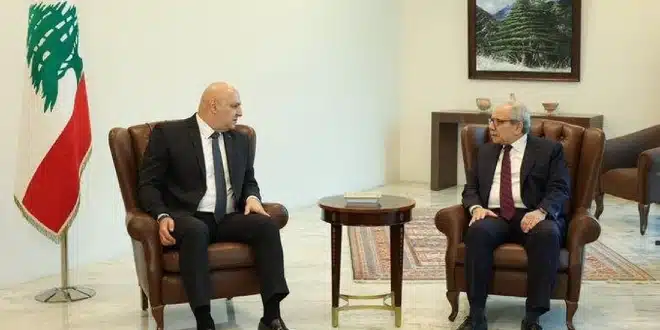Lebanese political leaders convened at Baabda Palace on Monday to deliberate on a U.S. proposal concerning Hezbollah’s disarmament and Israel’s military presence in southern Lebanon. The meeting, the second of its kind within days, included representatives of President Joseph Aoun, Speaker Nabih Berri, and Prime Minister Nawaf Salam. Discussions centered on a document delivered by U.S. envoy Tom Barrack, which outlines expectations for Lebanon to initiate the disarmament of Hezbollah in exchange for a complete Israeli withdrawal from Lebanese territory.
Lebanese officials have indicated that any commitment to disarm Hezbollah is contingent upon several prerequisites. These include the full withdrawal of Israeli forces from southern Lebanon, cessation of Israeli violations of the ceasefire, release of Lebanese detainees, and the demarcation of the Lebanese-Israeli border. A proposal has been made wherein Hezbollah would relocate its heavy weaponry north of the Litani River, aligning with the stipulations of the 2024 ceasefire agreement. However, officials emphasize that disarmament cannot proceed unilaterally without reciprocal actions from Israel.
U.S. Diplomatic Efforts and Regional Implications
Envoy Tom Barrack, who also serves as the U.S. ambassador to Turkey, has been actively engaging with Lebanese leaders to advance the disarmament agenda. His efforts are part of a broader U.S. strategy to stabilize the region following the recent conflict between Israel and Hezbollah. Barrack has underscored the importance of Lebanon asserting state control over all arms and has warned against Hezbollah’s potential involvement in the ongoing Israel-Iran tensions. The U.S. has not set a specific deadline for Lebanon’s response but has indicated that the timeframe is not open-ended.
Hezbollah’s Position and Internal Dynamics
Hezbollah has expressed conditional openness to discussions about disarmament, linking any such talks to Israel’s withdrawal from occupied Lebanese territories and the halting of airstrikes. The group, significantly weakened by previous conflicts and the loss of regional allies, faces mounting pressure both domestically and internationally. President Aoun has advocated for a national dialogue to integrate Hezbollah’s arsenal into state control, emphasizing that disarmament should occur through consensus to avoid internal conflict.
Lebanon is in the process of formulating an official response to the U.S. proposal, with further discussions anticipated upon Barrack’s return to Beirut in mid-July. The outcome of these negotiations will be pivotal in determining the future of Hezbollah’s armament and Lebanon’s sovereignty over its southern regions. The Lebanese leadership remains steadfast in its position that any disarmament efforts must be accompanied by tangible actions from Israel to ensure a balanced and equitable resolution.


